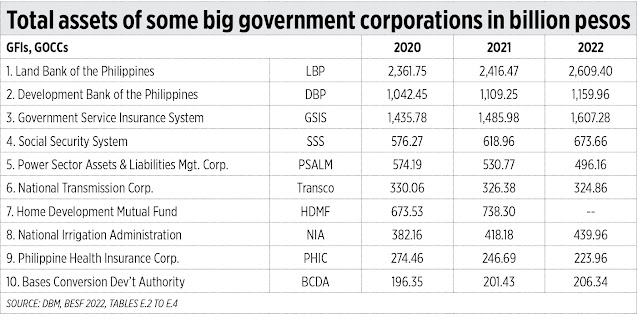SSS clarifies: Not a subsidy for operations
June 8, 2022 | 5:49 pm
https://www.bworldonline.com/opinion/2022/06/08/453611/sss-clarifies-not-a-subsidy-for-operations/
Letter To The Editor
WE WANT to thank you for your support in helping the Social Security System (SSS) further raise the awareness of our members and the general public through the publication of stories about SSS.
However, we would like to clarify one of the statements in the column article by Bienvenido S. Oplas, Jr. entitled, “Public finance and UPSE’s PDE batch 33,” published in BusinessWorld today, June 7, 2022 (https://bit.ly/Oplas060722).
Mr. Oplas discussed the “three elephants in the room” in public finance in the article. One of which is the endless subsidies to government corporations and financial institutions. He cited SSS as an example after the national government gave SSS P51 billion in 2020.
We want to inform him that the P51 billion given to SSS in 2020 was not a subsidy for the agency’s operation. The amount was intended and paid for the wage subsidies to over three million workers nationwide under the Small Business Wage Subsidy (SBWS) program.
SSS only served as the primary conduit for releasing the wage subsidies to workers of small businesses.
The SBWS is a joint program by SSS, the Department of Finance (DoF), and the Bureau of Internal Revenue (BIR) that provided wage subsidies to workers affected by COVID-19. It extended financial assistance to small and medium business enterprises affected by the pandemic and the nationwide enhanced community quarantine from March 2020 onwards, which affected the employment of those working in the private sector.
Workers of small businesses who lost their income while their respective areas were under enhanced community quarantine (ECQ) received a wage subsidy in two tranches ranging from P5,000 to P8,000, based on their respective areas of residence.
We want to emphasize that SSS is not receiving any subsidy from the national government for its operation. SSS remains financially viable in providing benefits to its stakeholders and is not on the verge of bankruptcy.
In this regard, may we kindly request to rectify the statement to avoid misconceptions from our members and employers that the national government is subsidizing SSS.
Thank you for the opportunity to clarify this matter.
-----------
Replying to SSS: Demonopolize social security
June 9, 2022 | 5:41 pm
By Bienvenido S. Oplas, Jr.
https://www.bworldonline.com/opinion/2022/06/09/453907/replying-to-sss-demonopolize-social-security/
IN a Letter to the Editor yesterday, “SSS clarifies: Not a subsidy for operations,” Mr. Fernando F. Nicolas of the Social Security System (SSS) said that “the P51 billion given to SSS in 2020 was not a subsidy for the agency’s operation (but) wage subsidies to over three million workers nationwide under the Small Business Wage Subsidy (SBWS) program.”
I checked again Tables B.9 and B.11 of the Department of Budget and Management’s Budget of Expenditures and Sources of Financing (BESF) 2022 and the term used is “Budgetary support to government corporations.”
So the SSS is correct, it is “support” to member-workers and not a “subsidy” for its regular operations. My apologies to SSS for mixing them along with PhilHealth, the National Food Authority, the National Irrigation Administration, the National Electrification Administration, Bases Conversion and Development Authority, and other government corporations that just rely on taxpayers’ subsidy yearly to make them “viable.”
Now that we discuss SSS, a state-owned pension monopoly for private sector personnel, we can extend the discussion to another state-owned pension monopoly, that for government sector personnel, the Government Service Insurance System (GSIS). And why they need to be demonopolized and the pension system be made competitive. Three quick reasons.
One, people mobility needs pension mobility. The SSS was created in 1957, and the GSIS was created in 1937, periods when it was generally assumed that people would work, retire, and die in the Philippines. No longer the case now, many Filipinos work a few years here, then work abroad, and go back and forth, even migrate and retire abroad. Same for foreigners who opt to work and retire here. Their pension contributions should be credited wherever they work and retire later. Private pension and insurance firms with a global network would be in a better position to offer this kind of service.
Two, government-owned and -controlled corporations (GOCCs) and government financial institutions (GFIs) like the SSS are political institutions subject to political pressure by any administration in power. Expansion of benefits, even if revenues are not there, extension of funding even to non-contributing members and sectors, are yearly political pressures they must endure and are likely to give in to.
Three, the government needs more privatization money to service and retire huge public debt without any major tax hike. SSS, GSIS, other GFIs and GOCCs are good candidates for privatization in the long-term. SSS and GSIS combined have P2.28 trillion in assets as of 2022.
Government regulations are expanding, not shrinking. When government regulates players and owns some players at the same time, there is a conflict of interest, and favoritism towards government-owned players is inevitable. That is why demonopolization and privatization of those government enterprises should be the appropriate fiscal policy over the medium to long-term.
-------------
See also:
BWorld 543, Inflation, mining and WHO pandemic treaty, June 12, 2022
BWorld 544, ESG, electricity prices, and BBM’s economic team, June 26, 2022
BWorld 545, Public finance and UPSE’s PDE batch 33, June 27, 2022.

No comments:
Post a Comment